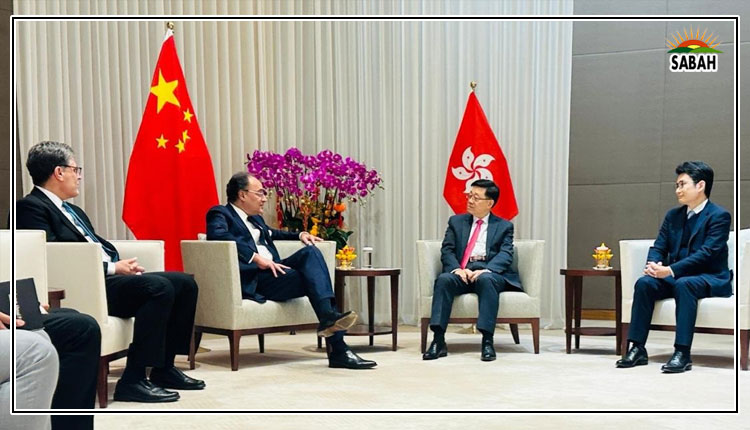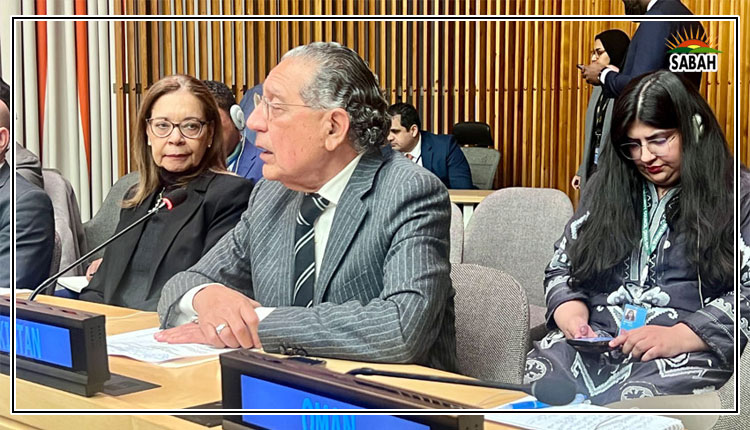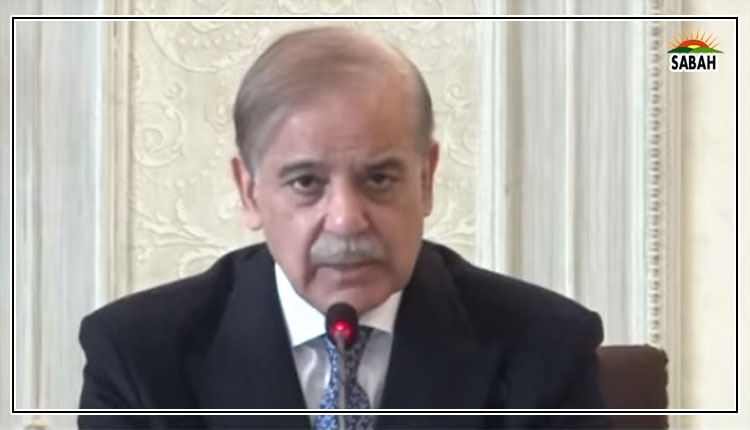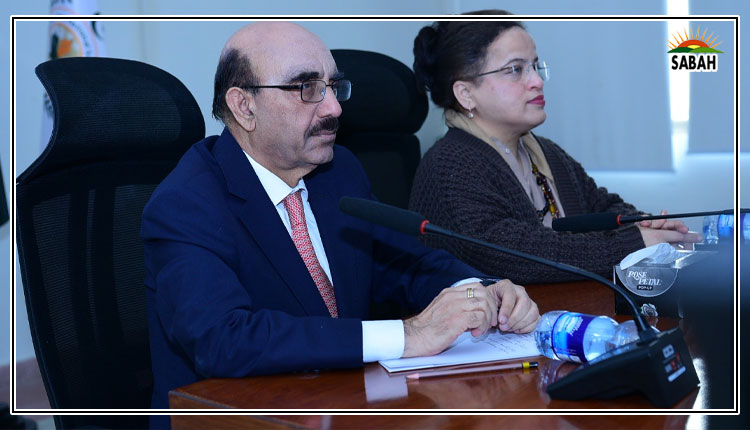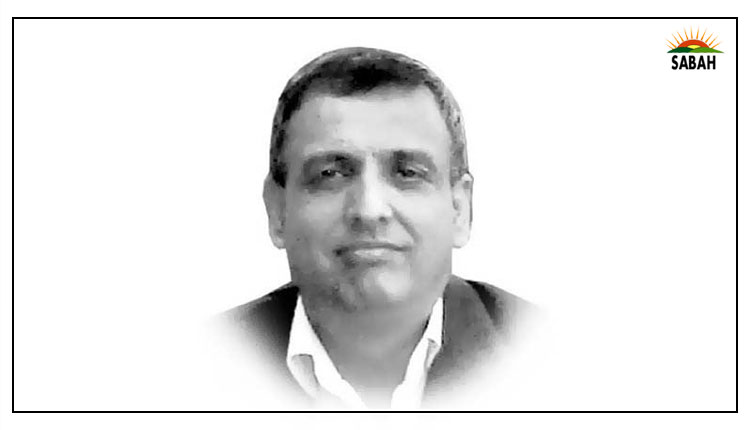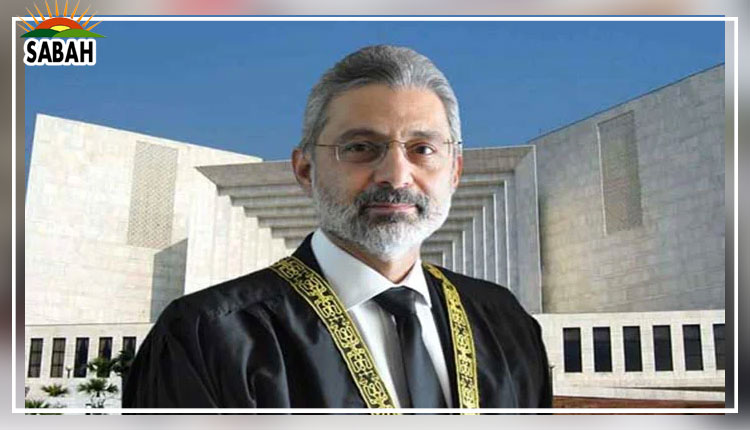Govt forms high-powered Judicial Commission headed by Justice Qazi Faez Isa & comprising CJs of BHC & IHC tasked to probe audio leaks
ISLAMABAD, May 20 (SABAH): The federal government has formed a high-powered judicial commission headed by Justice Qazi Faez Isa of the Supreme Court of Pakistan to probe the audio leaks related to the judiciary.
Chief Justice Balochistan High Court Justice Naeem Akhtar Afghan and Chief Justice Islamabad High Court Justice Aamer Farooq are members of the judicial body. The commission has been tasked to complete the job within 30 days.
Among the multiple audio leaks, the commission will also probe into the veracity of the alleged call between former Punjab chief minister Chaudhry Parvez Elahi and a sitting SC judge as well as another call between CM Elahi and a SC lawyer over the constitution of an apex court bench.
Sharing the reasons behind constituting the committee, the cabinet division’s notification dated 19th May stated that it was a result of the recent widely circulated controversial audios pertaining to the judiciary including the former chief justice and judges of the Supreme Court which raised “serious apprehensions about the independence, impartiality and uprightness of the Chief Justices/Judges of the Superior Courts in the administration of justice”.
The government said the audio leaks raised serious apprehensions about the independence of the judiciary in the public interest; therefore, it has constituted the commission under Section 3 of the Pakistan Commissions of the Inquiry Act, 2017.
It stated that such audio leaks have eroded public trust and serious concerns have been raised by the general public regarding the independence, impartiality and uprightness of the chief justice and judges of the superior courts.
The notification mentioned that the judiciary is one of the main pillars of the Constitution and the society’s confidence gets shattered when the independence of the judiciary is tarnished.
“It is imperative to inquire into the authenticity, correctness and veracity of these audio leaks in order to restore not just the credibility of the judiciary but also the public trust and confidence in the Judiciary in the larger public interest, as a matter of definite public importance,” it added.
Audio leaks to be probed
Call between former Punjab chief minister and an advocate regarding a sitting judge of the Supreme Court of Pakistan.
Call between former Punjab chief minister and an advocate about fixation of some cases before a particular SC bench.
Call between former Punjab chief minister and a sitting apex court judge.
Call between former chief justice of Pakistan Mian Saqib Nisar and a senior lawyer.
Call between a lawyer and a journalist on the outcome of a case before a particular SC bench.
Call between former Prime Minister of Pakistan Imran Khan and his party colleague about their links in the apex court.
Call between mother-in-law of CJP Umar Ata Bandial and wife of a lawyer regarding SC cases and conversation about an un-constitutional rule.
Call between ex-CJP Nisar’s son Najam Saqib and his friend mentioning his father in a political role.
Terms of reference:
The terms of reference (TORs) of the commission include inquiring the authenticity of the audio leaks allegedly concerning the judiciary; probe into the accuracy of allegations surfacing on print, electronic and social media allegedly involving LHC Chief Justice Muhammad Ameer Bhatti’s son-in-law influencing judicial proceedings before the provincial top court; to determine violation, if any, of the integrity of the process of administration of justice, independence of judiciary, right to fair trial and equality of citizens; to determine the liability incurred by any or all persons named in the alleged audio leaks against or any other person or public office holders including under the Pakistan Penal Code, 1860 or any other law; and to determine as to whether any disciplinary proceedings are attracted.
The TORs also include fixing the responsibility of any person or public office holder aiding and abetting by any act in violation of the laws of Pakistan so determined; recommending any necessary legal action by any agency, department or person; inquiring into and fixing responsibility with regards who is making the audio and whether they are fake or fabricated, while also recommending action to be taken against them; and the commission may inquire into any matter related to the case in the interests of justice.
The notification mentioned that the commission shall have all the powers granted to it under the Act and including those mentioned in section 10 of the Act. It directed all executive authorities — in federation or provinces — to comply with and aid the commission in discharging its function as well as comply with its directives.
“The Commission will be entitled to establish a Secretariat and appoint Secretary for the stated inquiry at the cost of the Federal Government. The Attorney General for Pakistan shall assist the Commission and provide the Commission with all documents and material that it requires,” the government’s notification read.
The commission, according to the notification, shall initiate the inquiry immediately after the notification of its constitution and shall conclude the inquiry and submit its report to the federal government within 30 days. However; if the Commission requires further time, the Federal Government shall grant it. The notification has been issued by Muhammad Munir Sadiq, Joint Secretary, Government of Pakistan, Cabinet Secretariat (Cabinet Division).
The series of audio leaks first began last year when private conversations featuring key government and opposition figures — including Prime Minister Shehbaz Sharif, PTI Chairman Imran Khan, PML-N Vice President Maryam Nawaz Sharif, and others — surfaced on social media.
In February, audios allegedly involving a sitting judge of the Supreme Court were leaked, leading to demands from the legal community for an investigation and appropriate measures if the leaks were verified.
The leaked audios were claimed to contain conversations between the judge and prominent politicians as well as specific lawyers. They quickly spread across social media and mainstream media platforms.
In April, another leaked conversation stirred up a storm in the country’s political landscape featuring a conversation between two women, one of whom is said to be the mother-in-law of a top-ranking serving judge of the Supreme Court, while the other is spouse of one of the PTI’s legal advisers — Khawaja Tariq Rahim.
While the identities of the women in question could not be independently verified, the clip — which had been widely circulated on social and mainstream media — evoked a stern reaction from across the political divide, along with calls for a thorough probe.
In the same month, two audios linked to former chief justice Saqib Nisar were leaked. One audio implicated his son, while the former top judge questioned the authenticity of the other audio, which allegedly featured a conversation between him and PTI’s legal adviser Khawaja Tariq Rahim.
Earlier in May, the National Assembly passed a motion demanding the formation of a special parliamentary committee to investigate the alleged audio leak of former Chief Justice Saqib Nisar’s son.
Since the start of the apex court’s suo motu proceedings over holding elections for two provincial assemblies within 90 days, some audio leaks purportedly involving SC judges and their family members have created quite a stir in the country’s political arena.
However, the top court has shown judicial restraint and refrained from initiating any separate proceeding to deal with the issue.





